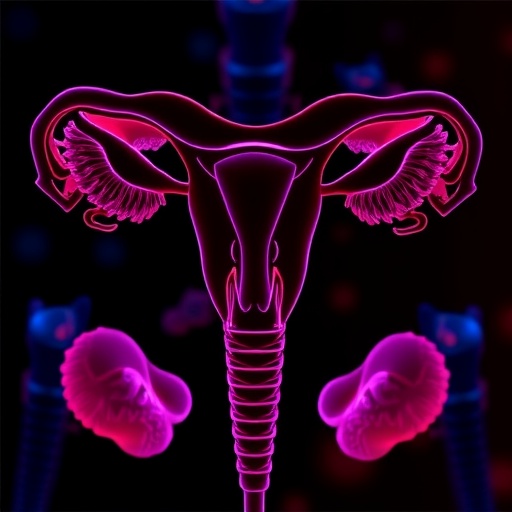A groundbreaking study emerging from the prestigious UCLA Health Jonsson Comprehensive Cancer Center has unveiled compelling evidence that the immunotherapy drug dostarlimab, when combined with conventional chemotherapy, significantly enhances survival outcomes for patients battling advanced endometrial cancer. Beyond merely extending life expectancy, this innovative treatment regimen has demonstrated the potential to improve the quality of life during this extended survival period by markedly reducing the burden of disease symptoms and debilitating treatment side effects.
The collaborative international trial meticulously analyzed patient data to quantify not only longevity but also the quality-adjusted time patients endured without progression of disease or severe toxicities. These metrics, which integrate survival duration with patient-reported quality of life and treatment tolerability, revealed that recipients of the dostarlimab plus chemotherapy combination experienced an impressive increase of at least 10% in high-quality survival time compared to patients who received chemotherapy alone. This enhancement translates to approximately 5.5 additional months of life characterized by minimal symptoms and manageable side effects, an unprecedented milestone in the therapeutic landscape of endometrial cancer.
Intriguingly, while the trial reported a higher incidence of serious adverse events—classified as grade 3 or above—among those treated with dostarlimab, the overall clinical benefit outweighed the associated toxicities. Most notably, immune-related side effects, a recognized class of complications linked to checkpoint inhibitors like dostarlimab, were effectively managed through early intervention protocols. The temporal distribution of these adverse events skewed heavily toward the initial phases of treatment, supporting the feasibility of this regimen with vigilant clinical monitoring.
.adsslot_UaeDJsxuoS{ width:728px !important; height:90px !important; }
@media (max-width:1199px) { .adsslot_UaeDJsxuoS{ width:468px !important; height:60px !important; } }
@media (max-width:767px) { .adsslot_UaeDJsxuoS{ width:320px !important; height:50px !important; } }
ADVERTISEMENT
Dostarlimab functions as an anti-PD-1 checkpoint inhibitor, a pioneering class of immuno-oncology agents designed to unleash the immune system’s capacity to recognize and destroy malignant cells. Prior investigations, particularly the RUBY phase 3 clinical trial, established dostarlimab’s efficacy in prolonging progression-free and overall survival among patients with advanced or recurrent endometrial cancer. However, until now, the crucial dimension of patient quality of life had been inadequately addressed in the clinical evaluation of this immunochemotherapy combination.
In this comprehensive assessment, 494 patients with advanced or recurrent endometrial cancer, deemed unlikely to benefit from surgical or irradiation cures, formed the study cohort. The data reflect the first interim analysis from the RUBY trial, uniquely shedding light on how the integration of personal well-being metrics can reshape the interpretation of therapeutic success. These findings herald a shift in oncology trials towards embracing holistic patient-centric endpoints that transcend traditional measures such as tumor shrinkage or survival alone.
The implications of this research reach far beyond statistical significance; they underscore a transformative evolution in the therapeutic paradigm for endometrial cancer. By demonstrating a statistically robust improvement in quality-adjusted survival, the study advocates for dostarlimab plus chemotherapy to be considered the new gold standard of care for this patient population—a critical endorsement that could influence future clinical guidelines and regulatory approvals.
Dr. Dana Chase, a distinguished professor of obstetrics and gynecology at UCLA and the study’s principal investigator, reflected on the findings as a pivotal advancement in gynecologic oncology. She emphasized how this pioneering integration of immunotherapy with chemotherapy not only protracts survival but also preserves the integrity of life lived during treatment—a dual victory for patients and clinicians alike.
The scientific community widely regards this study, published in the International Journal of Gynecological Cancer, as a seminal contribution to cancer immunotherapy research. It exemplifies the growing understanding that prolonging life without compromising quality is paramount, especially in malignancies historically associated with poor prognoses and debilitating treatment regimes.
Moreover, the research highlights the critical role of multidisciplinary international collaboration, uniting experts from various institutions who meticulously pooled expertise to validate these results. The multinational nature of the trial enhances the generalizability of findings, providing reassurance that these benefits are applicable across diverse healthcare settings and patient demographics.
This investigation was financially supported by GSK, underscoring the commitment of pharmaceutical leadership to advancing cancer treatment options. The engagement of industry partners in such rigorous clinical trials accelerates the translation of innovative therapies from bench to bedside, ultimately benefiting the broader patient community confronted with endometrial cancer.
In summarizing the impact, this study eloquently articulates a future where oncologic treatments not only extend lifespan but also elevate the quality of that extension. The detailed analysis of clinical endpoints married with patient-centered data heralds a new era of precision oncology that fully integrates patient voices into the evaluation of therapeutic success, offering hope for improved outcomes in cancers that have long challenged medical science.
Subject of Research: Advanced or recurrent endometrial cancer treatment using dostarlimab combined with chemotherapy.
Article Title: [Not explicitly provided in the source content]
News Publication Date: [Not specified in the source content]
Web References:
https://www.uclahealth.org/cancer
https://www.nejm.org/doi/full/10.1056/NEJMoa2216334
https://www.sciencedirect.com/science/article/pii/S1048891X25010552
http://dx.doi.org/10.1016/j.ijgc.2025.101935
References: Published study in International Journal of Gynecological Cancer, RUBY phase 3 clinical trial.
Keywords: Cancer, Cancer immunology, Uterine cancer, Cancer research, Cancer treatments, Oncology, Cancer immunotherapy, Immunology
Tags: advanced endometrial cancer treatmentcancer care advancementscomprehensive cancer treatment strategiesdostarlimab clinical trialendometrial cancer survival ratesimmunotherapy and chemotherapy combinationinnovative cancer therapiesmanaging serious adverse eventspatient-reported quality of life metricsQuality of Life in Cancer Patientsreducing cancer treatment side effectssurvival outcomes in endometrial cancer





